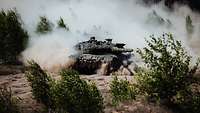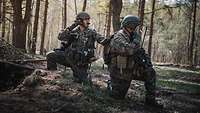
NATO
3+3 in the Baltic region: joining forces to protect NATONorth Atlantic Treaty Organization’s eastern flank
First paragraph of the article3+3: NATONorth Atlantic Treaty Organization in the Baltic region
Germany, the United Kingdom and Canada have assumed special military responsibility in the Baltic states. Together with their host nations Latvia, Estonia and Lithuania, they are coordinating all measures for the protection of NATONorth Atlantic Treaty Organization’s eastern flank.
NATONorth Atlantic Treaty Organization responded quickly and resolutely to Russia’s illegal annexation of Crimea in 2014. At that year’s NATONorth Atlantic Treaty Organization summit in Wales, the Alliance decided, among other things, to establish a Very High Readiness Joint Task Force. With this VJTFVery High Readiness Joint Task Force , NATONorth Atlantic Treaty Organization has created a spearhead force capable of quickly responding to changes in the threat situation in particular in Eastern Europe.
We, the Ministers of Defence of the enhanced Forward Presence (eFP) Host Nations, Estonia, Latvia and Lithuania, and the respective Framework Nations, the United Kingdom, Canada, and Germany reaffirm our commitment to protecting our populations and those of our Allies. We will continue to significantly strengthen the Deterrence and Defence of the Baltic Region as part of NATONorth Atlantic Treaty Organization’s Collective Defence obligations.Joint Declaration of the 3+3 NATONorth Atlantic Treaty Organization members, February 2023
At the 2016 Warsaw summit, NATONorth Atlantic Treaty Organization’s strategy for Eastern Europe was expanded to include enhanced Baltic Air Policing as well as the land-based enhanced Forward Presence (eFP). In this context, NATONorth Atlantic Treaty Organization’s heads of state and government agreed to deploy multinational Battlegroups in Poland and the three Baltic states. These Battlegroups were established in 2017. They comprise around 1000 personnel each to reinforce the armed forces of their host nations. Alongside their fellow soldiers, they demonstrate Alliance solidarity and strengthen the deterrence and defence posture on NATONorth Atlantic Treaty Organization’s eastern flank.
NATONorth Atlantic Treaty Organization combat forces protect Alliance territory
As a framework nation, Germany has command over the Battlegroup in Lithuania. Canada leads the Battlegroup in Latvia, the United Kingdom the one in Estonia, and the United States the one in Poland. The composition of these multinational combat elements varies and is coordinated with the host nations. In addition to the command of the Battlegroup, Germany, for example, permanently provides at least one combat company. Usually, more than 500 German troops are deployed in Lithuania as part of the eFP at any given time. Most of them are stationed in Rukla, some 100 km northwest of the capital city Vilnius. The Battlegroup is subordinate to Lithuania’s mechanised infantry brigade “Iron Wolf”.
Following Russia’s invasion of Ukraine on 24 February 2022, the eFP forces were reinforced immediately. As agreed at the NATONorth Atlantic Treaty Organization summit in Madrid, a forward command post of the Bundeswehr was established in Lithuania, which prepares both exercises and the deployment of a German combat brigade in the Baltic region. This brigade is part of NATONorth Atlantic Treaty Organization’s reinforcements for Eastern European countries entitled “enhanced Vigilance Activities”. Germany has pledged a future permanent deployment of a Bundeswehr brigade to Lithuania provided certain conditions are met.
All measures in the Baltic region must be taken in concert. In order to improve coordination of exercises, training, logistics and the exchange of information about activities on the eastern flank, the 3+3 format was established on Germany’s initiative. Within this format, the defence ministers of the three Baltic NATONorth Atlantic Treaty Organization members meet with those of Germany, Canada and the United Kingdom to intensify their cooperation, for example. The first 3+3 meeting was conducted in early 2023. Since then, further talks have followed, including at the level of commanders in the Baltic region. The 3+3 partners have announced their intention to conduct a joint major exercise.


Share content on